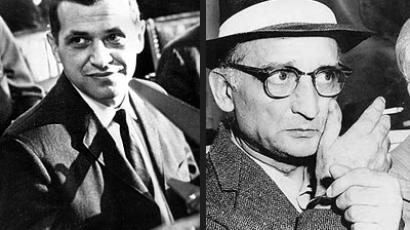Cloak, dagger and a blond wig? FSB says CIA agent nabbed in Moscow (VIDEO, PHOTOS)
Promises of millions, a new face and detailed instructions on a double-agent conspiracy in Moscow. Bearing the hallmarks of a Cold War spy thriller, Russia’s counterintelligence agency says it caught a CIA officer trying to flip a Russian operative.
The Federal Security Service (FSB) Public Relations Center
announced that detained individual was Ryan Christopher Fogle, a
career diplomat working as the third secretary of the Political
Section of the American embassy in Moscow.
The agency stressed that Christopher had “special technical equipment” in his possession, including an additional wig, multiple pairs of dark sunglasses and a lot of cash in euro – along with a Moscow atlas, a compass, a knife, and an American Bic lighter.
The detainee, who was sporting a blond wig at the time of his interception, was delivered to the FSB receiving office for questioning. Following all of the necessary procedures, he was handed over to representatives of the US embassy in Moscow.



The one-page letter to “a dear friend” found in Christopher’s
possession was to be clandestinely delivered to the would-be
recruit.
The correspondence proposed a US$100,000 payment for an interview
with the prospective double agent, as well as $1 million per annum
if the candidate chose to accept the mission and supply the
American side with information.
Proving its technological prowess in the digital era, the alleged
spy further offered step-by-step instructions on how to create a
new Gmail account to be used for future contacts.
Ever-so-savvy, the document stressed the importance of not
divulging any real contact information like phone numbers, email or
home addresses when creating an email account for the purposes of
spying on one’s own country.
It further discouraged the use of personal handheld mobile devices
and laptops when registering the account, proposing a more
anonymous setting like an internet café would be more judicious. If
that didn’t pan out, the prospective recruit was told to buy a new
mobile device or computer with the express purpose to be used for
the express purpose of establishing contact. The new device was to
be paid for in cash, and all expenses would be reimbursed.

Once a new Gmail account was created, the recruit was told to write a letter to [email protected] and wait one week for a reply.
“Thank you for reading this. We look forward to working with you in the nearest future. Your friends,” the missive concludes.
On Tuesday, The Russian government announced that Fogle had been branded a “persona non grata,” demanding his immediate expulsion from Russia.
“At a time when the presidents of our countries have reaffirmed their readiness to broaden our bilateral relations, including special service [cooperation] in the battle with international terrorism, such provocative actions in the spirit of the “Cold War” do not facilitate a strengthening of mutual trust,” the Russian foreign ministry said in a statement.

US Ambassador to the Russian Federation Michael McFaul refused to comment on the detention of his subordinate or his alleged part in the cloak and dagger plot.
On his Twitter account the ambassador simply wrote ‘no’ when questioned about Ryan Fogle.
McFaul has a date with the Russian Foreign Ministry, however, where he has been summoned to give an explanation for the not-so-undercover incident.
Former assistant secretary of state Jon Alterman told RT the timing of the incident was “strange” in light of the upcoming international conference on Syria spearheaded by Moscow and Washington.
“It clearly will have an effect on the talks. I don’t think it tells us anything new about US-Russian relations. What is strange is the timing, because when it comes to catching spies – if this even was a spy – you get to choose when you take action. And the decision to act immediately before the summit seems to me calculated to affect the summit,” he argued.
The website of the American embassy in Russia says that its Political Section is engaged in “bringing to the attention of the Russian government the US position on the issues of foreign policy and security.” The section’s other task is to “inform Washington about the main provisions of the foreign and defense policy of Russia,” as well as Russian domestic political life.
Watch more in RT's Tom Barton's report
















